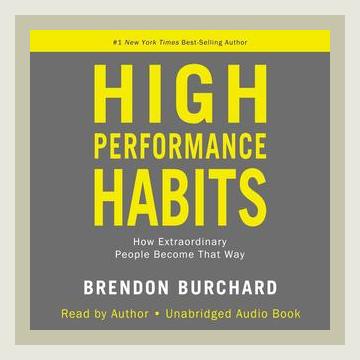Human Resources and Talent ManagementEmployee Development
High Performance Habits: How Extraordinary People Become That Way by Brendon Burchard – Summary
Brendon Burchard’s “High Performance Habits: How Extraordinary People Become That Way” is an insightful guide that distills the essential habits observed in high performers across various fields. This book focuses on six habits that, when consistently implemented, contribute to elevated performance levels and sustained success. The practical advice and action steps provided make it a valuable resource for anyone seeking personal and professional growth.
Overview of High Performance Habits
Burchard’s book is anchored around six specific habits that are instrumental for achieving high performance:
- Seek Clarity
- Generate Energy
- Raise Necessity
- Increase Productivity
- Develop Influence
- Demonstrate Courage
Each habit is explored in-depth with actionable strategies that can be immediately applied to both personal and professional contexts.
Habit 1: Seek Clarity
Key Points:
- High performers are clear about who they are, what they want, and how to get there.
- They frequently ask questions to ensure their goals, values, and priorities are aligned.
- Clarity extends to understanding how one’s work contributes to broader missions and values.
Examples from the Book:
- Burchard recounts how high performers visualize their future and are specific about their ambitions.
- Case studies of athletes who set clear performance goals and continually refine their strategies.
Actionable Steps:
- Define Your Intentions: Each morning, set an intention for what you intend to achieve that day. Be specific about tasks and goals.
- Reflect Regularly: Weekly reflection sessions can help you assess your progress and adjust goals as necessary.
Habit 2: Generate Energy
Key Points:
- Energy management is crucial—both physical and mental energy need sustenance.
- High performers take care of their physical health, often prioritizing exercise, proper nutrition, and rest.
- Emotional and mental energy are kept high through practices such as meditation or hobby engagement.
Examples from the Book:
- Burchard shares anecdotes of CEOs who schedule time for workouts and meditative practices to maintain peak performance levels.
- The story of a high-performing sales executive who uses midday breaks to rejuvenate through short walks.
Actionable Steps:
- Exercise Daily: Incorporate at least 30 minutes of physical activity into your daily routine.
- Scheduled Breaks: Set reminders to take short breaks every 90 minutes during work hours for mental refreshment.
Habit 3: Raise Necessity
Key Points:
- High performers have a heightened sense of necessity, which drives them to perform better.
- They link personal identity with their goals, making the success of their mission a critical part of who they are.
- They frequently remind themselves of the stakes involved in their performance.
Examples from the Book:
- Burchard cites examples of high achievers who regularly reflect on their purpose and the impact of their work.
- Stories of artists who thrive under the pressure of tight deadlines because they have connected their work to their core identity.
Actionable Steps:
- Purpose Reminders: Write down why your work matters and keep it visible on your workspace.
- Accountability Partners: Share your goals with a partner or mentor who will hold you accountable and remind you of your purpose.
Habit 4: Increase Productivity
Key Points:
- Productivity for high performers isn’t just about doing more; it’s about doing what matters.
- They focus on generating output that is high quality and relevant.
- Time blocking and priority management are crucial tools.
Examples from the Book:
- Burchard gives examples from tech industry leaders who use specific productivity frameworks such as the Eisenhower Matrix to prioritize tasks.
- The narrative of a novelist who dedicates specific blocks of time to writing, free from distractions.
Actionable Steps:
- Time Blocking: Allocate specific blocks of time for high-priority tasks and minimize distractions during these periods.
- Daily Priorities: Begin each day by listing the top 3 tasks that must be accomplished, ensuring they align with larger goals.
Habit 5: Develop Influence
Key Points:
- Influence is about getting people to believe in and support your ideas and goals.
- Key behaviors include teaching, building trust, and encouraging others.
- High performers are often great leaders, mentors, and communicators.
Examples from the Book:
- Burchard recounts stories of managers who spend time mentoring their teams, which in turn enhances team performance.
- The example of a non-profit leader who secures funding by effectively communicating their mission’s impact.
Actionable Steps:
- Mentor Others: Dedicate time each week to mentor a colleague or junior in your field.
- Active Listening: Practice active listening skills in every conversation to build trust and improve your influence.
Habit 6: Demonstrate Courage
Key Points:
- Courage in high performers is about taking bold actions and making decisions despite risks.
- It involves speaking up for what’s right and pushing through fears to achieve goals.
- Ordinary people rise to extraordinary challenges by consistently choosing courage over comfort.
Examples from the Book:
- Burchard shares examples from history where leaders took stands that were controversial but necessary.
- The story of an entrepreneur who took significant financial risks to innovate and eventually achieved greater success.
Actionable Steps:
- Micro-Bravery: Identify one small act of courage you can do each day—be it sharing a new idea or addressing a conflict.
- Seek Feedback: Regularly ask for feedback on your performance and use it to confront personal and professional blind spots.
Conclusion
“High Performance Habits: How Extraordinary People Become That Way” provides a comprehensive framework for anyone looking to elevate their performance in a sustainable way. By incorporating these six habits—seeking clarity, generating energy, raising necessity, increasing productivity, developing influence, and demonstrating courage—individuals can achieve enhanced productivity, greater satisfaction, and long-term success. Each habit is underpinned by concrete examples and actionable steps, making the principles not just theoretical but also practical and attainable. Through disciplined application of these strategies, anyone can push the boundaries of their potential and achieve extraordinary levels of performance.
